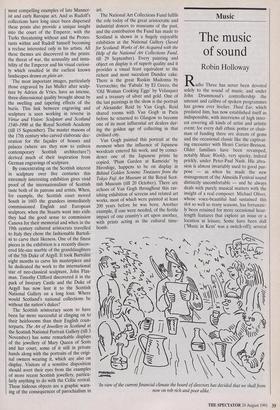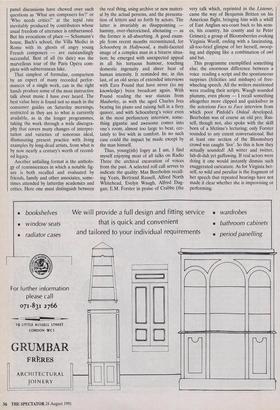M usi c
The music of sound
Robin Holloway
adio Three has never been devoted solely to the sound of music, and under John Drummond's controllership the amount and calibre of spoken programmes has grown ever livelier. Third Ear, which predated him, has now established itself as indispensible, with interviews of high inter- est covering all kinds of artist and artistic event; for every dull ethnic potter or chair- man of funding there are dozens of gems and the occasional classic like the captivat- ing encounter with Henri Cartier-Bresson. Older familiars have been revamped, notably Music Weekly, very sparky, indeed prickly, under Peter-Paul Nash. His abra- sion is almost invariably used to good pur- pose — as when he made the new management of the Almeida Festival sound distinctly uncomfortable — and he always deals with purely musical matters with the insight of a real composer. Michael Oliver, whose voice-beautiful had sustained this slot so well so many seasons, has fortunate- ly been retained for more occasional hour- length features that explore an issue or a location at leisure. Some have been dull (`Music in Kent' was a switch-off); several 'In view of the current financial climate the board of directors has decided that we shall from now on rob rich and poor alike.' panel discussions have chewed over such questions as 'What are composers for?' or `Who needs critics?' at the tepid rate inevitably produced by contributors whose usual freedom of utterance is embarrassed. But his evocations of place — Schumann's house, Bach's school, the Villa Medici in Rome with its ghosts of angry young French composers — are outstandingly successful. Best of all (to date) was the marvellous tour of the Paris Opera com- plete with subterranean lake.
That simplest of formulae, comparison by an expert of many recorded perfor- mances of a single work, can in the right hands produce some of the most instructive talk about music I have ever heard. The best value here is found not so much in the consumer guides on Saturday mornings, restricted as they are to what is currently available, as in the longer programmes, taking the work through a wide discogra- phy that covers many changes of interpre- tation and varieties of sonorous ideal, illuminating present practice with living examples by long-dead artists, from what is by now nearly a century's worth of record- ed legacy.
Another unfailing format is the antholo- gy of reminiscences in which a notable fig- ure is both recalled and evaluated by friends, family and other associates, some- times attended by latterday academics and critics. Here one must distinguish between
the real thing, using archive or new materi- al by the actual persons, and the presenta- tion of letters and so forth by actors. The latter is invariably as disappointing hammy, over-rhetoricised, alienating — as the former is all-absorbing. A good exam- ple from recent months reconstituted, for Schoenberg in Hollywood, a multi-faceted image of a complex man in a bizarre situa- tion; he emerged with unexpected appeal in all his tortuous humour, touching domestic ingenuity and sheer heat of human intensity. It reminded me, in this last, of an old series of extended interviews with Ezra Pound that have never (to my knowledge) been broadcast again. With Pound reading the war stanzas from Mauberley, as with the aged Charles Ives beating his piano and raising hell in a fiery quaver, and with Schoenberg's voice even in the most perfunctory interview, some- thing gigantic and awesome comes into one's room, almost too large to bear, cer- tainly to live with in comfort. In no such case could the impact be made except by the man himself.
Thus, young(ish) fogey as I am, I find myself enjoying most of all talks on Radio Three the archival excavation of voices from the past. A selected roll call serves to indicate the quality: Max Beerbohm recall- ing Yeats, Bertrand Russell, Alfred North Whitehead, Evelyn Waugh, Alfred Dug- gan; E.M. Forster in praise of Crabbe (the
very talk which, reprinted in the Listener, came the way of Benjamin Britten on his American flight, bringing him with a whiff of East Anglian sea-coast back to his sens- es, his country, his county and to Peter Grimes); a group of Bloomsberries evoking Virginia Woolf, ending with a fascinating, all-too-brief glimpse of her herself, swoop- ing and dipping like a combination of owl and bat.
This programme exemplified something else: the enormous difference between a voice reading a script and the spontaneous surprises (felicities and mishaps) of free- wheeling speech. All the writers mentioned were reading their scripts. Waugh sounded plummy, even phony — I recall something altogether more clipped and quicksilver in the notorious Face to Face interview from which poor Pinfold's Ordeal developed. Beerbohm was of course an old pro; Rus- sell, though not, also spoke with the skill born of a lifetime's lecturing; only Forster sounded to any extent conversational. But at least one section of the Bloomsbury crowd was caught 'live'. So this is how they actually sounded! All witter and twitter, lah-di-dah yet guffawing. If real actors were doing it one would instantly dismiss such exaggerated caricature. As for Virginia her- self, so wild and peculiar is the fragment of her speech that repeated hearings have not made it clear whether she is improvising or performing.



















































 Previous page
Previous page